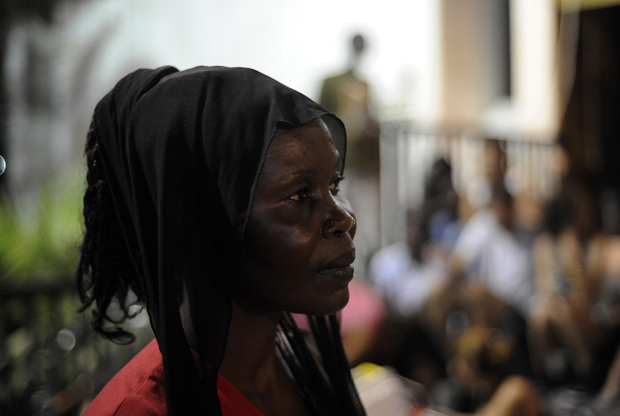
(AFP Photo \ Khaled Desouki)
Laws alone are not enough to put an end to different types of violence against women and girls, Mervat Al-Tallawy, head of the National Council for Women’s Rights (NCWR) said during a Sunday press conference.
Al-Tallawy was speaking on behalf of the government-affiliated group during the press conference on violence against women.
“The efforts of the government, local community services and civil society groups together should address the root causes behind the continuing violent practices against women such as early marriage, female genital mutilation (FGM) and domestic violence,” Al-Tallawy said.
Al-Tallawy further stated that the council prepared a strategic national plan to fight violence against women, which will be announced in January, and aims to be applied in all government and public institutions, including schools and universities. This came in a meeting attended by representatives from the Ministries of Justice, Health, Housing, Youth, Interior, and Social Solidarity on Saturday, MENA reported.
Meanwhile, 2014 has been characterised by a number of events aimed at fighting violence against women, increasing public awareness, and calling for more law enforcement. The most recent events were organised by different civil society pressure groups earlier in December, celebrating the end of a UN-sponsored international 16-day campaign.
Several activists also shed light on Egypt’s most common form of street violence; sexual harassment and assault.
At least 1,191 cases of sexual assault and harassment took place across Egypt during the second “100 days of Al-Sisi’s rule”, covering a time frame between 17 September to 25 December. The figures came as part of a year-end report prepared by the Appropriate Communication Techniques (ACT) independent organisation, and I Saw Harassment civil pressure group.
The report said it only traced reported cases and those that were made public in the media. It put Alexandria on top of the list with the highest number of incidents (425), representing over 35% of the total, in comparison to Cairo (364) and Giza (58).
The governorate of Kafr El-Sheikh followed with 104 cases, and the Red Sea governorate recorded 29 cases, as 2014 witnessed a number of sexual assault cases reported by tourists.
In March, the Ministry of Tourism withdrew the licences of two popular Red Sea resorts over a rape attempt involving a policeman and a Russian tourist. In July, a driver was arrested in Sharm El-Sheikh for raping a Russian tourist.
While the report stated that legislation and law enforcement were not enough, it also highlighted incidents where police were involved. Early investigation reports this week confirmed that two policemen raped a woman inside their car in Shubra El-Kheima.
Another case took place in November, when the wife of a police officer reported being verbally harassed by two policemen in a security checkpoint, who also assaulted the husband. The Ministry of Interior interfered to end the conflict between the policemen.
Harassmap, a group working on documenting sexual harassment across the country, also reported in December that 81.8 percent of sexual harassment crimes take place in public transportation, such as the metro and 82.3 percent of eyewitnesses to the harassment do not interfere or help the victim.
I Saw Harassment concluded its report with a series of demands related to reducing violence against women. It specifically addressed those who intend to run as candidates for the upcoming parliamentary elections to include human rights and gender equality in their programs.

